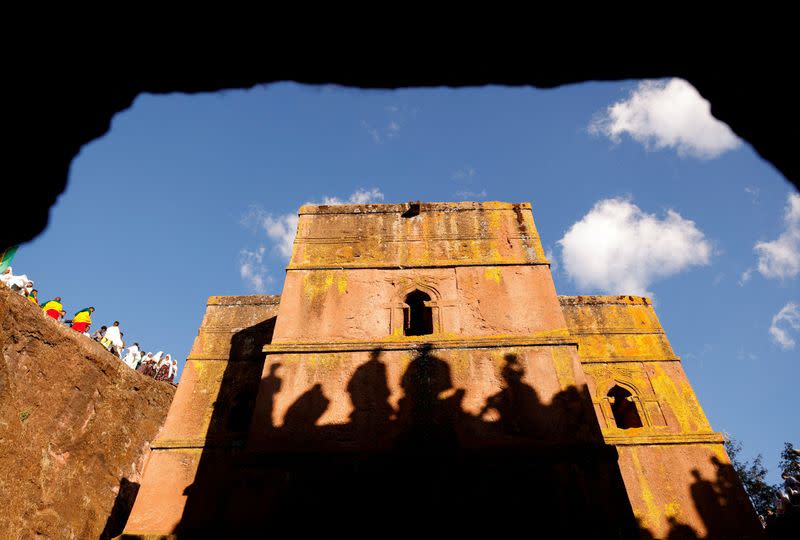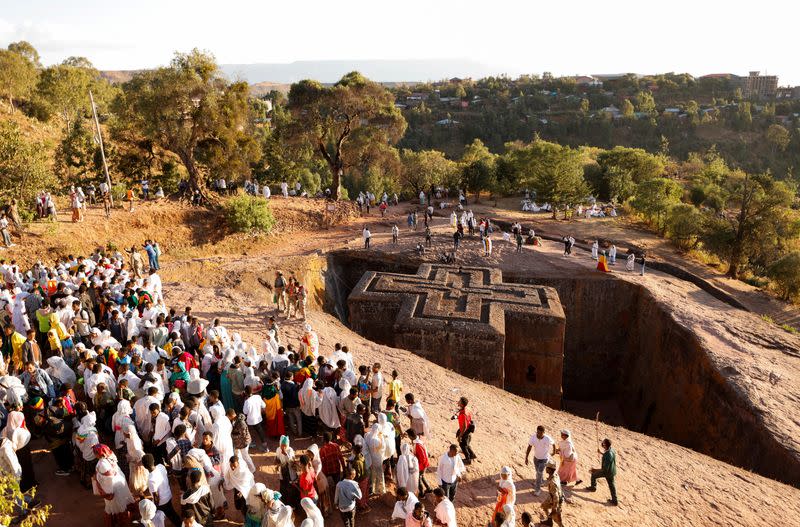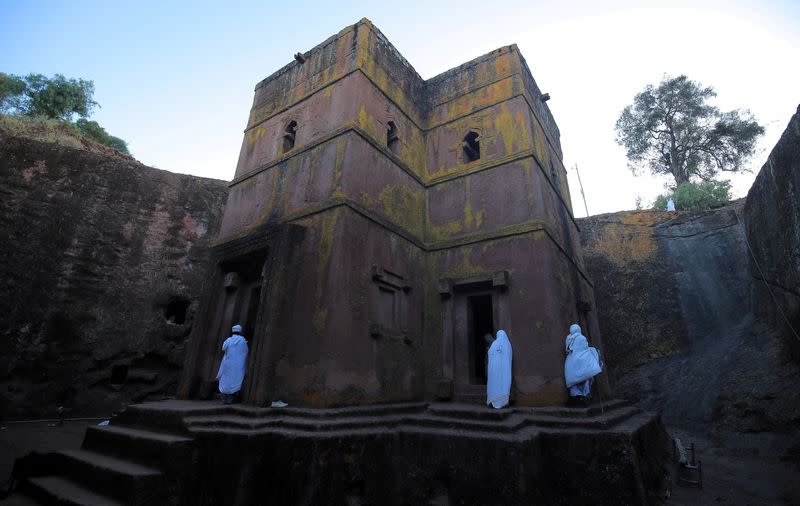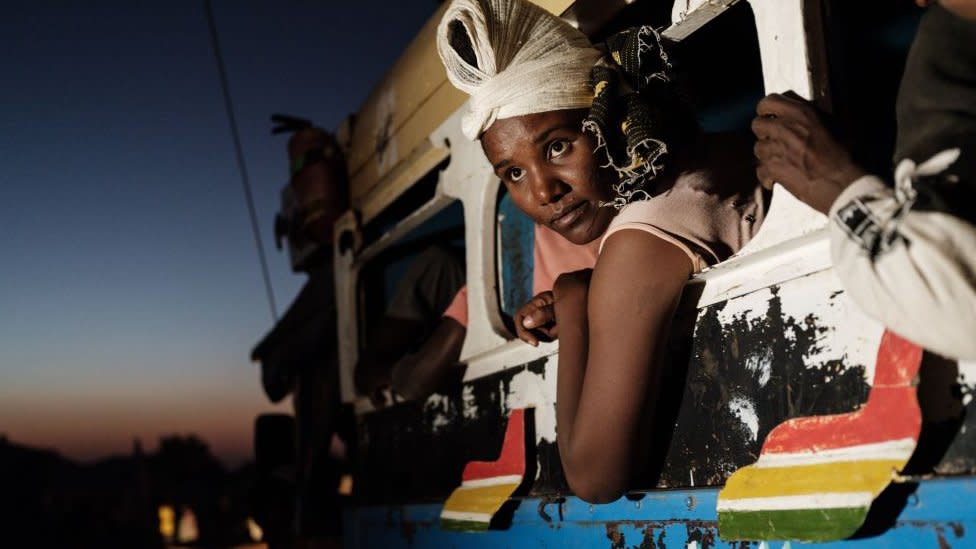Fighting in Ethiopia's Amhara region prompts fear for ancient churches

A fresh eruption of fighting in northern Ethiopia has raised concerns among residents about the safety of rock-hewn churches in the town of Lalibela dating back to the 12th and 13th centuries.
Fano militiamen fighting the Ethiopian army in the Amhara region over-ran Lalibela and Gondar for several days in August marking Ethiopia's most serious security crisis since a two-year civil war in the neighbouring region of Tigray ended a year ago.
In a separate incident highlighting instability in the region, at least 30 people were killed in fighting between members of Ethiopia's two largest ethnic groups, the Oromo and Amhara, in a town in the region's Oromiya Special Zone, two residents said.
Fano fighters battled alongside the army during the war in Tigray, but relations between the two have soured, particularly after the federal government in April moved to integrate security forces operated by each region into the police and army.
On Sunday, Ethiopian soldiers fired heavy weapons 11 times from locations near the churches in Lalibela, a deacon said, sending damaging shockwaves through one of the subterranean places of worship.
"The vibrations are affecting the churches," the deacon said, requesting anonymity for fears of reprisals.
Two residents confirmed the fresh wave of fighting. One said the army was stationed outside Lalibela and by the airport and started fighting on Saturday, firing heavy weapons towards a mountain overlooking the town.
The Ethiopian government, federal army and Amhara's regional administration did not immediately respond to Reuters' requests for comment.
Lidetu Ayalew, an Amhara politician based in the United States who grew up near Lalibela, said he feared the churches could be harmed.
"The churches risk being struck and destroyed due to careless firing of heavy weapons," he said in a statement on Monday.
Designated a world heritage site by the United Nations in 1978, Lalibela's 11 medieval cave churches were carved out of monolithic blocks to form a "New Jerusalem", after Muslim conquests halted Christian pilgrimages to the Holy Land.
The UN in August said in the latest round of fighting in Amhara at least 183 people had been killed in the first month. With internet connections down across the region, Reuters has been unable to obtain a clear picture of the latest situation.
The latest Oromo and Amhara clashes between Friday and Sunday were over farmland in Mesno town in the Oromiya Special Zone, which has a majority Oromo population, two residents said.
"At least 30 people died during the clash while trying to defend their areas and their farmland," said a priest in the town who did not wish to be identified, adding he had witnessed 12 of the dead being buried.
Ethiopia's federal government and Amhara region's government had no immediate comment to Reuters' requests for comment.
Ethiopia plans vote to solve Tigray-Amhara territory dispute.
Hundreds of thousands reportedly fled the disputed areas during the civil war.
The territorial dispute between Ethiopia's northern Amhara and Tigray regions will be settled through a referendum, the government says.
The row has threatened to disrupt the fragile peace following the end of the civil war in Tigray a year ago.
Tigray controlled the fertile lands before Amhara forces seized them in 2020 during the conflict.
Rights groups have accused those forces of carrying out ethnic cleansing in the disputed areas.
The allegations were dismissed by Amhara's regional government.
The disputed areas, near Ethiopia's border with Sudan, were a key flashpoint in the two-year conflict between the Tigray People's Liberation Front (TPLF) and the federal government.
The war ended after a peace agreement was signed last November in South Africa.
Many of the one million displaced people, who remain sheltered in makeshift camps throughout Tigray, are reported to have fled the contested areas.
The Amhara administration says the territory was forcibly annexed by Tigray in the 1990s when the TPLF was the dominant political force in Ethiopia.
In a lengthy report last year, rights groups Amnesty International and Human Rights Watch said evidence collected through interviews showed that the disputed areas had been the site of some of the worst atrocities committed during the conflict and were been largely ignored.
The African Union envoy, former Nigerian President Olusegun Obasanjo, has said around 600,000 people died during the conflict overall. Researchers put the hundreds of thousands of civilian deaths down to fighting, starvation and lack of health care.
In Monday's statement evaluating the year since the peace deal, the government said the displaced people would be returned and the federal military would assume responsibility for local security.
The federal authorities say they have "taken a position on the fate of the disputed areas to find a solution mutually beneficial to all sides".
"A direction has been put in place for a referendum to be held in accordance with the constitution," the government's communication service said.
It did not say when the referendum would be held.
The statement - released in Amharic and English - also hailed progress made in the past 12 months including the formation of an interim administration in Tigray. But it accused the administration of "dragging its feet" over fully implementing the peace deal.
It also suggested the administration was still keeping combatants despite agreeing to disarm.
Tigrayan forces have handed over their heavy weapons but it is believed that small and light arms have not been given up. The TPLF, in a statement last week, said the ceasefire had not been fully implemented because large numbers of people were still displaced.
This comes amid heavy fighting between Ethiopian federal troops and local militias across large parts of the Amhara region.
The fighting broke out in April after the federal government's directive to disarm regional forces and armed groups.
Fighters from the Fano militia say they have captured several towns in Ethiopia's second-biggest region. The federal government has not yet commented on the claims.
In August, the militias entered several of the region's main cities, temporarily taking control of an airport in the historic town of Lalibela before they were pushed out by the army.
The Ethiopian Human Rights Commission (EHRC) has accused federal forces of human rights violations in the clashes with Fano rebels.
The Ethiopian government denied the EHRC report, terming it "unbalanced".
Western countries including Britain and the US have called for a dialogue.
- Questions and Answers
- Opinion
- Story/Motivational/Inspiring
- Technology
- Art
- Causes
- Crafts
- Dance
- Drinks
- Film/Movie
- Fitness
- Food
- Spiele
- Gardening
- Health
- Home
- Literature
- Music
- Networking
- Other
- Party
- Religion
- Shopping
- Sports
- Theater
- Wellness
- News
- Culture
- War machines and policy





